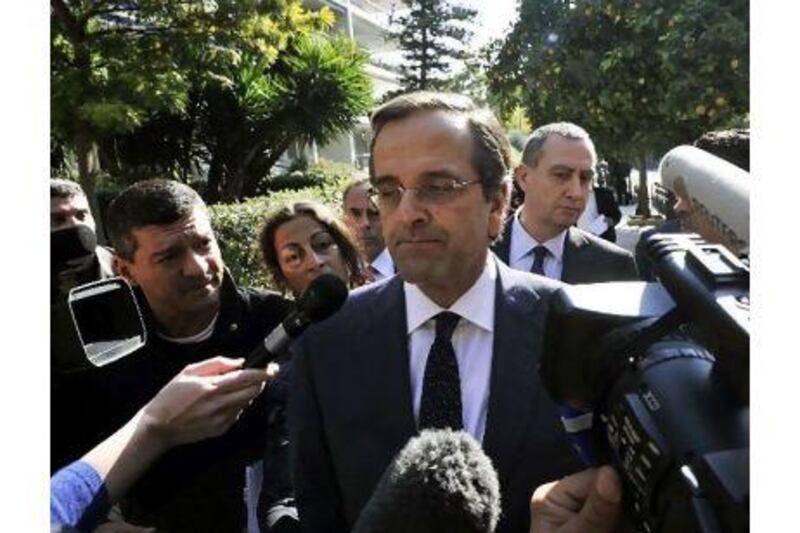ATHENS // Greece was lurching towards a political denouement last night as party leaders from the left and the right were wrapped in negotiations over a national unity government to push through the international rescue package for the country's out-of-control debt.
The Socialist prime minister, George Papandreou, was said to be ready to resign but only after a unity coalition with the opposition conservative New Democrats had been agreed.
The parties appeared to be at odds over the lifespan of the new coalition and the timing of new elections. The New Democracy leader, Antonis Samaras, demanded the immediate resignation of Mr Papandreou.
The political crisis in Athens is seen elsewhere as a threat to the tortuously negotiated deal reached in Brussels at the end of last month to bail out Greece, counter the risk of contagion to several other European countries and safeguard Europe's banks.
But in Athens, many observers and analysts were sceptical the package was really in danger in the aftermath of the government winning a vote of confidence in parliament on Thursday night.
"The worst-case situation is that the current negotiations break down and Papandreou and his government continue to rule. It seems to me that they are committed to implementing the conditions of the bail out," said Dimitrios Sotiropoulos, a political scientist at the University of Athens
He noted Mr Papandreou had made clear he was now above all interested in his legacy and that this centred on making sure Greece stayed in the single currency euro zone: "That means go ahead [and]get the next tranche of the bail out allocated to Greece, implement the austerity measures and so forth."
European leaders yesterday kept up the pressure on Greece. Ahead of a meeting of European Union finance ministers in Brussels today, the Belgian prime minister, Yves Leterme, told Belgian television: "We are still at the same point. The Greeks must prove that they will really fulfil the conditions."
Greece's finance minister, Evangelos Venizelos, has said Greece needs the next instalment of bail-out funds by December 15. But European leaders have said the money will not be forthcoming until Athens has approved the whole rescue package.
In Athens, the tension was palpable among observers of the goings-on in parliament.
"You cannot imagine what is going on here. It's a madhouse. We have no idea what is going to happen," one political editor at the ERT television channel said early in the evening.
Other Athenians were more depressed than excited about the political drama. "I stay in all day watching it on TV. I feel very tense about the whole situation," said one cultural studies student.
Mr Sotiropoulos, of the University of Athens, sounded more confident about the future of his country. He rejected the possibility of debilitating social unrest in the likely case the political parties agreed on the rescue package with its attending austerity measures. Greece was nothing like the countries of the Arab Spring, he said.
"In the Arab Spring countries you have extreme poverty, incredible gaps in income, large religious movements and also an ambivalent role of the military and the security forces. I must stress the point that this is a western democracy."
He also estimated the anger among the population, which has led to a series of riots in recent months, was already on the wane.
"Now the population has gradually grown to understand that unfortunately the only alternative is go back to the other currency, the Drachma," he said.
Abandoning the euro and leaving the EU was inconceivable for Greece, a country that places itself at the heart of Europe, he added.
That theme was taken up by Vassilis Karamitsanis, a lawyer in his 30s who does business all over Europe. "If we leave the EU, I will leave Greece. The other countries must be willing to give us asylum in that case."
Mr Sotiropoulos said he could not imagine the rest of Europe abandoning Greece. "If you start losing segments of the common market, why did you build it in the first place?"
He was mildly critical of the way that European leaders had handled the crisis so far and said Greece could do without some of the populism that had been directed at it.
"This is not an African country on the road to development and this has not been understood. This is why, both among foreign leaders and foreign observers, you have a mixture of welcome suggestions of what to do and unwelcome stereotypes."






